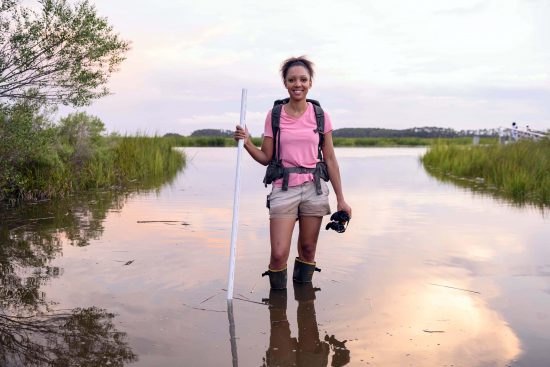Coastal Resilience

People are a part of and depend on the natural environment. Protecting the environment requires understanding the linkages between the ecosystem and human interactions. Coastal environments will house 70% of the world’s population by 2030. Such influx of human movements generates additional burdens on already fragile ecosystems.
Problems in our coastal areas, such as inadequate water and wastewater management, overuse of chemicals on agricultural lands and aquaculture, and decaying infrastructure, cause threats to water quality, food safety, and biodiversity as the population expands. Global issues such as climate change elevates these problems. Sea-level rise, increased frequency and intensity of floods, droughts, wildfires, and storms exacerbate the stress on the coastal ecosystem. Georgia Southern University researchers seek feasible solutions to protect the coastal environment and promote sustainable adaptations in and among coastal communities.
Public Impact Research
Coastal Resilience at Georgia Southern University aims to protect natural environments while supporting human health, culture, and long-term economic growth for future generations. Faculty research advances innovative science, technology, education, and business practices to address challenges for current and future generations’ resiliency in a changing environment.
People are a major component of this impact area. Our experts seek to educate and facilitate behavioral changes among communities so that locals become stewards of their coastal environment. Enhancing the resilience of residents and businesses via sustainable practices is aimed to ensure adaptation to coastal change for the generations to come.
Faculty Expertise
At Georgia Southern, research on Coastal Resilience employs interdisciplinary teams to investigate impacts of coastal hazards on the ecosystem and human health. Faculty come from a broad range of backgrounds including natural sciences, social sciences, engineering, education, and public health.
Conservation Biology and Shoreline Ecology
Research teams engage in conservation biology and shoreline ecology to protect species endangered by climate change, habitat loss, and human activities.
Water Quality
Georgia Southern researchers study how water pollutants impact the health of coastal ecosystems and how they persist in groundwater, rivers, wetlands, and shorelines. Still others are identifying sources and developing waste control and mitigation strategies to improve water quality and health.
Water Resources
Our researchers also focus on surface and groundwater hydrology to identify threats to depleting water resources and develop practices to maintain safe water availability.
Research Facilities
- Institute for Coastal Plain Science
- Sustainable Aquaponics Research Center
- Center for Wildlife Education
- Botanical Gardens
- Center for STEM Education
Last updated: 5/8/2023
